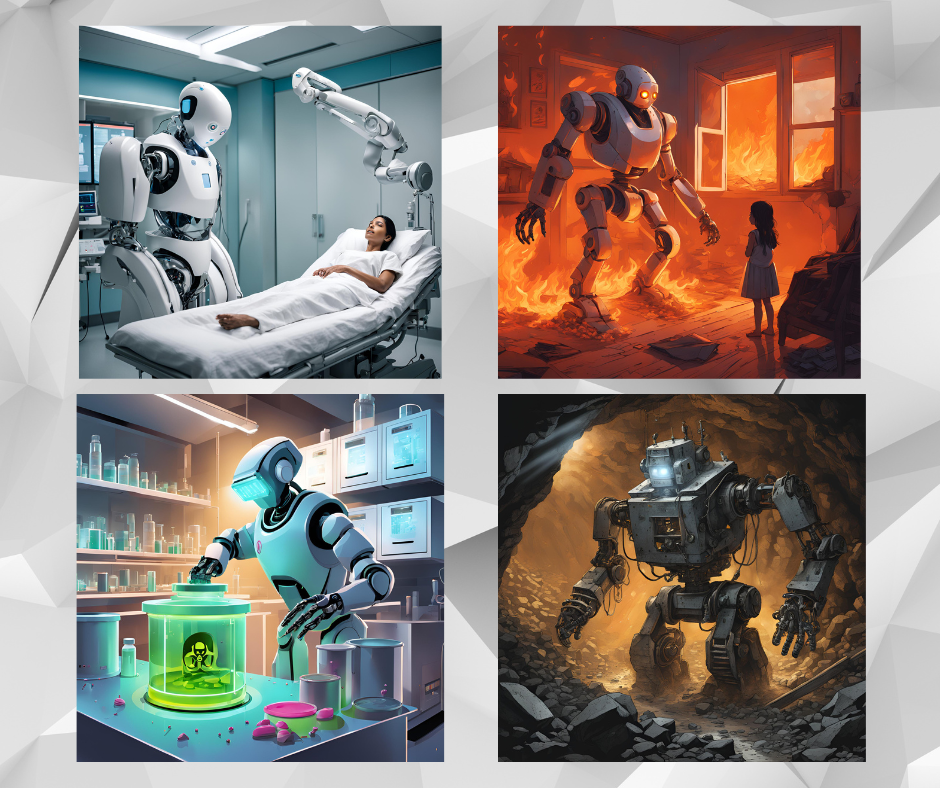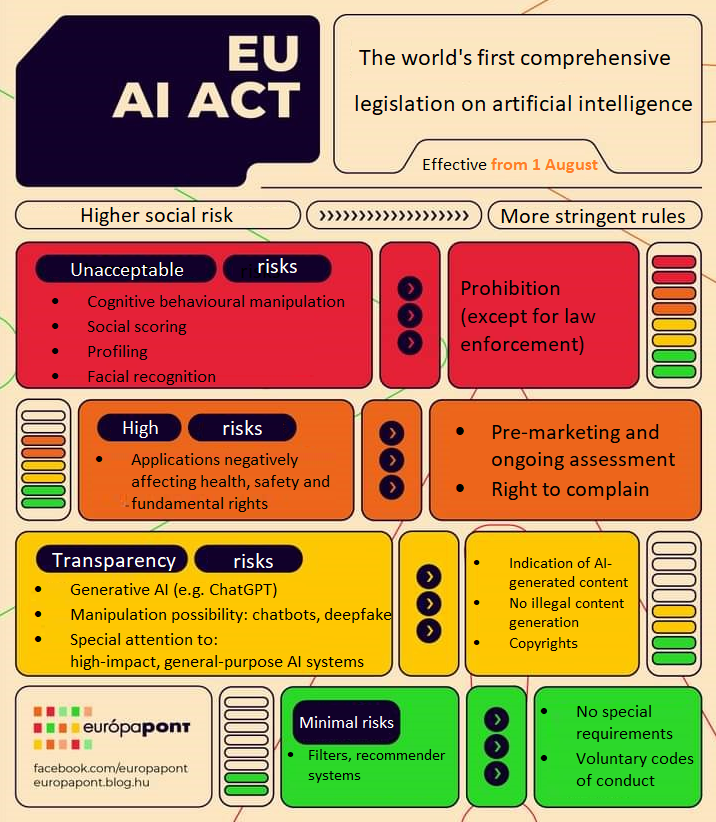Artificial Intelligence in Adult Education, Training and Learning
Artificial intelligence
’Artificial intelligence (AI) … is intelligence exhibited by machines, particularly computer systems. It is a field of research in computer science that develops and studies methods and software that enable machines to perceive their environment and use learning and intelligence to take actions that maximize their chances of achieving defined goals.’ (Wikipedia)
Although artificial intelligence became widely known through science fiction literature, it now plays a significant role in everyday life and industry, bringing substantial changes to various fields. AI systems are capable of replacing tasks that were previously performed exclusively by humans, such as pattern recognition, decision-making, and automation.
Currently, there are ongoing debates on ethical and scientific issues regarding AI development and its areas of application.
Due to automation, many repetitive and low-skilled jobs may disappear, potentially increasing unemployment and social inequalities..
At the same time, AI systems perform repetitive tasks more quickly and accurately, such as data analysis or the automation and optimization of manufacturing and logistics processes. AI-based chatbots and virtual assistants also enhance customer service efficiency by reducing waiting times and improving quality assurance.
Due to the time factor, the use of artificial intelligence can indeed lead to significant cost savings. AI systems can analyze vast amounts of data in a short time, greatly supporting organizations in making well-founded decisions. However, the extensive use of data by these systems also raises significant privacy concerns.
AI decision-making processes, especially when dealing with large datasets, do not always produce the desired outcomes, raising further ethical questions regarding accountability and decision-making. Additionally, AI systems are prime targets for various hacker groups, making the secure and controlled use of AI particularly important in sectors such as banking, homeland security or defence.

Source: The image was created using the artificial intelligence-based image generator of Canva application
Artificial Intelligence in the European Union
Artificial intelligence is a highly promising technology that can offer numerous benefits to society. However, to minimize its drawbacks and the potential harm they may cause, appropriate regulations and ethical guidelines are necessary.
For these reasons, the European Union has proposed new rules and measures regarding artificial intelligence and, in February 2024, established the European AI Office. The new regulations aim to ensure that advancements in AI foster trust, create safe environments, guarantee fundamental rights, and at the same time, promote continuous innovation in AI applications.

Original source in Hungarian: https://europapont.blog.hu/2024/09/03/mesterseges_intelligencia_eu_ai_act
Information about the legal framework and implementation can be obtained at the following contacts:
Regulation of the European Parliament and of The Council on artificial intelligence:
https://eur-lex.europa.eu/legal-content/EN/TXT/HTML/?uri=OJ:L_202401689
A European level Coordinated Plan on Artificial Intelligence
https://digital-strategy.ec.europa.eu/en/policies/plan-ai
European approach to artificial intelligence
https://digital-strategy.ec.europa.eu/en/policies/european-approach-artificial-intelligence
European AI Office
https://digital-strategy.ec.europa.eu/en/policies/ai-office
The EU AI Act Explained
https://www.youtube.com/watch?v=JhJ1EaoTDtQ
Artificial intelligence in education, training and learning
Artificial intelligence is also highly applicable in the field of education and training. Today, there are a significant number of platforms available to professionals that, on one hand, support their self-development (such as for andragogues, trainers, etc.), and on the other hand, complement their daily educational and training work.
How can various AI-driven tools assist?
The currently available tools can support professionals in the following tasks:
- Creating lesson plans and teaching materials,
- Designing and evaluating interactive, creative tasks,
- Simplifying explanations,
- Generating examples,
- Creating presentation materials and background content,
- Translation,
- Spell-checking,
- Research and summarization on a given topic,
- Creating images and videos based on descriptions,
- Writing blog and social media articles,
- Others.
Applications powered by artificial intelligence
With various applications, not only learning but also the process of education and training can become more convenient and efficient, as they provide the opportunity for flexible, self-paced skill development.The applications below offer good examples of activities related to more effective and flexible adult learning.
‘ChatGPT is an AI-powered chatbot that engages in text-based conversations, provides answers to questions, and generates creative content.’
Bing AI (Operates with Microsoft Edge browser)
The AI-powered version of Microsoft's Bing search engine, which provides search and natural language interaction.
An artificial intelligence developed by Google designed to perform a wide range of creative and practical tasks, such as writing and problem solving.
An image-generating artificial intelligence that creates spectacular and unique images based on text descriptions.
Artificial intelligence capable of paraphrasing texts, correcting grammar and creating summaries.
Artificial intelligence for quick preparation of marketing, advertisements and creative texts.
An AI tool designed for generating and editing visual and creative content, such as videos and images.
An AI-powered assistant program that supports developers in coding by providing code suggestions and debugging assistance.
An advanced language model used for writing, analysing texts, and solving natural language tasks.
An artificial intelligence developed by Meta, offering various AI models for tasks such as image recognition, speech recognition, and language processing.
Offers a high-performance computing platform for running AI models and machine learning algorithms at high speed.
An AI-powered chatbot designed for creative text generation, conversation, and sharing information on various topics.
A content generation tool specialized in creating marketing copy, blog posts, and social media content.
A writing assistant tool that helps generate content quickly and creatively in various writing styles.
A writing assistant AI that helps with editing and developing essays, research papers, and other long-form texts.
A speech recognition and note-taking application that automatically transcribes meetings and interviews into text.
An information retrieval and knowledge-base tool that provides quick and accurate answers to complex questions.
A research assistant tool that rapidly organizes and analyzes relevant scientific publications.
An AI that evaluates scientific publications and helps identify the scientific consensus on a given topic.
A citation analysis tool that shows whether a publication has been cited positively, negatively, or neutrally.
An AI-powered tool for processing PDF files, enabling content search and interactive discussions about documents.
If we want to explore AI possibilities in more depth or learn the basics ourselves, the following links provide short, flexible, and easily digestible resources.
Courses for Learning the Basics of Artificial Intelligence
Introduction to Artificial Intelligence (AI) (English, free)
An introductory course by IBM covering the fundamentals of artificial intelligence.
An introductory course by IBM covering the fundamentals of artificial intelligence (English, free)
A 4-module, approximately 21-hour course titled Machine Learning For All, offered by the University of London on the Coursera platform.
Beginner: Introduction to Generative AI Learning Path (English, free)
A short course by Google providing an introduction to the basics of artificial intelligence.
Artificial Intelligence for Beginners (English, free)
A 12-week, 24-hour course on the basics of artificial intelligence from Microsoft.
Amazon AWS Platform (English, free)
Amazon offers more than 100 free courses on the AWS platform, where participants can learn the basic skills of machine learning, generative AI and basic models.
Summary
Artificial intelligence can support teachers, educators, and other professionals in adult learning in various ways, enhancing the learning experience and increasing the efficiency of the teaching-learning process.
AI provides assistance in personalized education, reducing administrative tasks, and improving student outcomes. Its comprehensive use enables professionals to work more effectively and creatively while dedicating more time to their own and/or their learners' individual needs.
AI does not replace teachers, trainers, or education professionals but rather complements and strengthens the educational, training, and learning processes.




